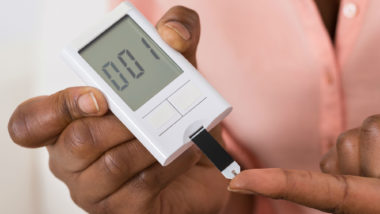
In addition to common side effects, there may be additional, more severe dangers of Invokana, including infections or amputation.
Invokana Lawsuits
The widow of a man who died in 2018 due to complications from the diabetes drug Invokana has filed a lawsuit against Johnson & Johnson, the manufacturer of the drug.
Giacomo L. died last year at the age of 68 after taking Invokana to control his diabetes. Giacomo and countless others may have been unaware of the serious side effects associated with Invokana, including kidney problems and life-threatening infections such as Fournier’s gangrene, according to the Rochester Democrat & Chronicle.
Giacomo’s widow filed her lawsuit following her husband’s death. According to the suit, Giacomo started to experience side effects about a month after he began taking Invokana in September 2016. Although he went to his primary care physician when he began experiencing discomfort with urination and genital skin irritation, Giacomo’s doctor was not seriously concerned and told him to follow up in several months.
In January 2017, Giacomo went to the hospital complaining of flu-like symptoms in addition to increased urinary and genital pain. Giacomo died the next day in the hospital’s emergency department. According to his widow, Giacomo contracted a Fournier’s gangrene infection due to his use of Invokana, which lead him to develop sepsis and die.
In addition to accusing hospital health care providers of failing to properly treat her husband, Giacomo’s widow is also claiming that Johnson & Johnson misled the public about the safety of Invokana in order to continue to rake in huge profits from the medication. Invokana resulted in over $1 billion in sales for Johnson & Johnson in 2017. According to the company, around 1.5 million people take the drug every year, and more than 19 million prescriptions have been written for the medication.
More than 1,100 lawsuits have been filed against Johnson & Johnson by victims who claim that the drug caused them to develop serious side effects, including the need for amputation, and families who are pursuing wrongful death settlements. Many of these lawsuits have been consolidated into multidistrict litigation, and a settlement fund containing an undisclosed financial sum has been established for victims with similar Invokana claims.
Additionally, according to data compiled by ProPublica, some drug companies may be paying doctors millions of dollars to promote their drugs. For example, in 2017 alone, nearly 1200 doctors were paid in excess of $100,000 by drug companies for services other than consulting. In this case, it usually means promotional speaking.
This financial incentive may affect the likelihood of doctors to prescribe Invokana and other promoted drugs to patients, regardless of the potentially serious health side effects. According to some research, the most promoted drugs may be less safe and effective than other medications.
What is Invokana?
Invokana (canagliflozin) is a type-2 diabetes medication that is part of the sodium-glucose co-transporter 2 (SGLT2) inhibitor drug class. Drugs in this class work to reduce blood glucose levels by reducing the amount of glucose that is reabsorbed by the kidneys. Instead, this glucose is excreted through urine.
Does Invokana Have Side Effects?
According to the Invokana website, the diabetes drug can have numerous side effects. This includes the following issues:
- Dehydration caused by frequent urination
- Dizziness
- Lightheadedness
- Vaginal yeast infection
- Low blood sugar (headache, drowsiness, weakness, dizziness, confusion, irritability, hunger, fast heartbeat, sweating, shaking, feeling jittery)
There also can be more serious side effects of Invokana, including:
- Bladder infections (fever, urgent urination, burning/pain during urination)
- Kidney injury (reduced food or liquid intake, lose of liquid through vomiting and diarrhea, changes in urine amount, leg and foot swelling)
- Ketoacidosis, a condition involving increased ketones in the blood or urine (nausea, vomiting, stomach area pain, tiredness, breathing troubles)
- Hyperkalemia, a condition of too much potassium in the blood (muscle weakness, slow/irregular heartbeat)
- Allergic reactions
- Bone fractures
- Fournier’s gangrene, a flesh-eating genital infection that can lead to serious disfigurement or death
What Are the Dangers of Invokana?
In addition to these side effects, Invokana may be associated with an increased risk of amputation. The U.S. Food and Drug Administration (FDA) released a safety alert in May 2017, informing the public of the risk.
“Based on new data from two large clinical trials, the U.S. Food and Drug Administration (FDA) has concluded that the type 2 diabetes medicine canagliflozin (Invokana, Invokamet, Invokamet XR) causes an increased risk of leg and foot amputations,” the FDA safety alert states.

The CANVAS trial revealed that 5.9 out of every 1,000 Invokana patients suffered from an amputation over the course of a year. In comparison, the placebo group experienced 2.8 amputations for every 1,000 patients.
The CANVAS-R trial showed similar results, with 7.5 out of every 1,000 Invokana patients needing an amputation in the course of a year. The placebo group in this study had 4.2 amputations for every 1,000 patients over the course of a year.
Many of the amputations affected the toe and middle of patients’ feet, but some also involved the leg – both above and below the knee. Some of the studied patients reportedly required two amputations, in some cases involving both limbs.
These risks earned Invokana a black box warning, the most prominent warning the FDA can require. The FDA also encourages doctors to monitor patient amputation risks before prescribing Invokana.
“You may be at a higher risk of lower-limb amputation if you: have a history of amputation, have heart disease or are at risk for heart disease, have had blocked or narrowed blood vessels (usually in the leg), have damage to the nerves (neuropathy) in the leg, or have had diabetic foot ulcers or sores,” the Invokana website states.
Unfortunately, although a black box warning has been added to Invokana, the types of conditions the drug is able to be prescribed to treat were recently expanded. In September 2019, the FDA approved Invokana as a treatment to reduce the risk of developing end-stage kidney disease, worsening of kidney function, cardiovascular death, and heart failure in adults who suffer from diabetes and diabetic kidney disease. Despite the potential dangers of Invokana, these conditions may be serious enough to warrant the use of the drug.
Contact an experienced Invokana attorney today to discuss your legal options if you or a loved one had to undergo a lower limb amputation after taking Invokana, Invokamet or Invokamet XR, including a toe amputation, foot amputation, knee amputation or leg amputation. Fill out the form on this page to obtain a FREE case evaluation with an Invokana amputation attorney.
ATTORNEY ADVERTISING
Top Class Actions is a Proud Member of the American Bar Association
LEGAL INFORMATION IS NOT LEGAL ADVICE
Top Class Actions Legal Statement
©2008 – 2025 Top Class Actions® LLC
Various Trademarks held by their respective owners
This website is not intended for viewing or usage by European Union citizens.
Get Help – It’s Free
Join a Free Invokana Class Action Lawsuit Investigation
If you qualify, an attorney will contact you to discuss the details of your potential case at no charge to you.
Please Note: If you want to participate in this investigation, it is imperative that you reply to the law firm if they call or email you. Failing to do so may result in you not getting signed up as a client or getting you dropped as a client.
E-mail any problems with this form to:
[email protected].
Oops! We could not locate your form.












